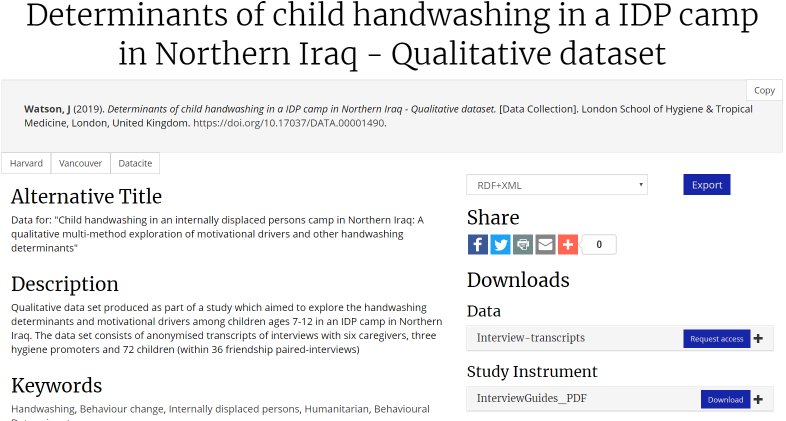LSHTM Data Compass is a digital repository of research items produced by LSHTM researchers – staff and students alike – that have been made available for analysis and use in further research. The repository lists almost 1,500 item, including databases & spreadsheets, interview and focus group transcripts, software tools and processing scripts, as well as questionnaire and interview guides. This includes items hosted in the repository itself and those held in third party systems.
Data description
Each research item is described in a metadata record. The metadata record provides an overview of its content, how it was collected or created, who was involved, the time period in which work was performed, geographic location(s) where it was obtained, and how it may be accessed and cited.

Many datasets held in LSHTM Data Compass are made openly available for use in further research, while others are covered by ethical conditions that necessitate controlled access. In these cases, the researcher must apply for access via a web form. The web form contains several questions, asking the applicant to specify the data they wish to access, the purpose for which it will be used, and outline any experience they have working with similar data. On submission, these details are sent to the data creators for follow-up.
Finding research data and other outputs in LSHTM Data Compass
Research data and other outputs held in LSHTM Data Compass can be located in two ways:
1. Browse

The browse menu can be used to gain a broad overview of research outputs held in LSHTM Data Compass. Browse options available include:
A full list of browse options can be found on the repository browse page.
2. Search

A Simple Search can be performed by typing one or more terms in the Search menu on the repository home page. This will search for the value across all fields in the repository’s database and produce a list of matched records. This is helpful for gaining a broad overview of content within the data repository, presenting datasets that you may not have expected, but often provides results that aren’t relevant to the researcher’s needs.
An Advanced Search will provide fewer, more focused results in comparison to simple search. The Advanced Search menu can be found in the menu at the top of each repository page. Advanced Search allows a researcher to search for items that contain information in a specific field (e.g. title, description, creator name) or a combination of values (e.g. data made available over a set time period that was collected using one or more specified methods).
Using LSHTM Discover to find research data
LSHTM Discover can be used to locate digital resources held by LSHTM and other academic institutions. Many LSHTM researchers use it to find online books, research papers and conference proceedings, but it also contains an index of 5 million datasets made available by academic and commercial organisations around the world, including LSHTM Data Compass.

So, why should you look for datasets in LSHTM Data Compass when LSHTM Discover is available? LSHTM Discover is useful, but is currently limited to datasets published up to 2018 and does not index all metadata published by digital repositories, leading to search results omitting potentially relevant data. For this reason, it is often useful to look for relevant data in specific digital repositories, as well as performing a cross-repository search.
Other health data search engines
Several research data services exist that may be used to locate data relevant to your needs. These include the Registry of Research Data Repositories, DataCite Search, bioCADDIE DataMed, and Google Dataset Search. A more extensive list of health data repositories and data search engines can be found on Service Desk.
Support Advice and regular training on locating research datasets and other reusable research outputs is available through the LSHTM Library & Archives Service. Contact the Research Data Manager via Service Desk for further details.
Image: ‘Eye Health: Operating spectacles’. Copyright: London School of Hygiene & Tropical Medicine.







